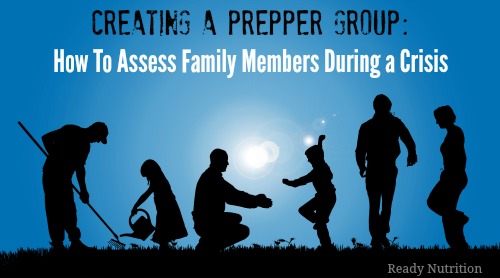
Jeremiah Johnson provides some excellent advice on what areas to look into when assessing family or group members and what the keys to success are.]
Good Day, ReadyNutrition Guys and Gals! This article is going to give some pointers on continuous assessment of family members during a SHTF scenario. Some of you may wonder what that is all about. The concept is simple: as a survivor, you will need to wear “many hats” on the team (your family) that you’re a part of. The best way to ensure continuity and success is to address problems before they arise or nip them in the bud in their infancy.
What Hats Will You Need to Wear During a Crisis?
Much of this depends on your role and position in the family. Are you the Dad or the Mom? What kinds of things does your family depend on you to do as the normal course of your daily routine? What special skills do you have? What special needs (medical, psychological, physical limitations, etc.) do your family members have?
Therefore, we have a few steps to begin with.
- First you must assess yourself and your capabilities.
- Secondly you must consider each and every member of your family, assessing their strengths and limitations realistically.
All of this is taking one thing for granted that needs mention: this article is assuming you are the “bedrock,” a stable family member that the others will rely upon.
But is that the case?
Be True to Yourself
Now is the time to identify your own weaknesses and limitations. Be honest! As Shakespeare eloquently phrased it, “To thine own self be true.” Be honest: identify your physical and emotional limitations. Guess what?
You may read this article and realize you are “not the one” the family will rely upon…so bring these words to the family member who will be the bedrock!
Be the facilitator of information. Be someone who is in on making the plan! This is part of being a team: make a role for yourself and stick to it. You don’t have to be the leader in order to take a leadership role in certain things, such as planning and organizing. You may begin the assessment to have another member of the family finish it up. Does this mean you’re finished? Absolutely not! You then become the backup: the one they’ll depend on if the primary leader “goes down,” so to speak.
You need to initiate group discussions on this topic with your family. Few and far in between are the families where one person does everything for a whole multitude of family members. Your family has many things to identify: special medical needs and special medications; emotional stability; “history” of performance under pressure. Knowing these basics, for example, will help you later on when the pressure is higher and the stressful conditions have arisen.
These Are the Keys To Success:
You will succeed by assessing the changes in your family member’s behavior.
In brief, you will be watching out for changes in the normative behavior…indicators that a problem either exists or has the potential to exist. Nervousness in speech or behavior, or extreme unwillingness to do something that would normally be done are indicators. Excessive or unreasonable fears are others. I did a piece earlier on handling stress. You may find that in certain situations you may need to medicate them according to an existing prescription, or you may wish to give them herbal supplements to help with their needs.
As mentioned in previous articles, St. John’s Wort (Hypericum perforatum) is extremely good for stress and anxiety, as well as depression. As concentrations vary per manufacturer, consult the package instructions. The herb is available in capsule form in Wal-Mart. Herbal teas, such as Chamomile and Peppermint have calmative effects, as they are nervines.
Balance your immediate needs with your operational capabilities.
It may not be convenient to boil water and make a tea at the moment; you may have to rely on the capsule forms of the herbs, deferring the tea-making until a time when you are able. In the meantime, your assessments do not stop. Talk to your family member. Reassure him or her that you are there and that other members of the family are there as well.
Remember, although your family member may make it through a crisis, this is not a guarantee that they won’t have another situation. Recidivism can best be avoided through reassurance. You will only be on top of a situation if you stay on top of it at all times. Life is continuous maintenance, and that is what this is.
Your task is to train your family member to be able to assess himself or herself.
In this manner, when a crisis threatens to rise, they can be more self-aware and responsible to help you do your job. After a crisis has been successfully navigated through, you should talk to the affected family members as well as the rest of the group. By understanding the circumstances, it reinforces all of them: to aid the main member who is afflicted by whatever fear or problem, as well as being able to spot it and avoid it for themselves. Nobody is immune to a breakdown or a crisis.
Self-assessment and continuous assessment of family members helps to maintain effective control and smoothness in operations. Assessments take time and practice until they will eventually become a part of your routine. Every member of the family can perform them, and they can provide you with a powerful tool for avoiding or managing crises that may arise. Develop your techniques now and it will be a smoother transition for you when a disaster strikes or the SHTF. Be safe and help one another!
JJ

? Whatever. I read it.